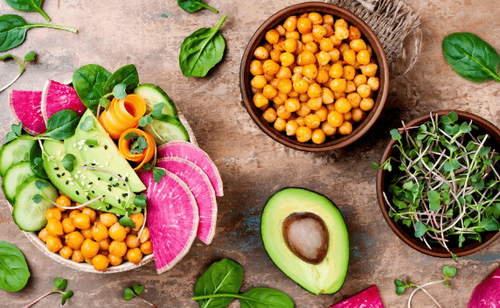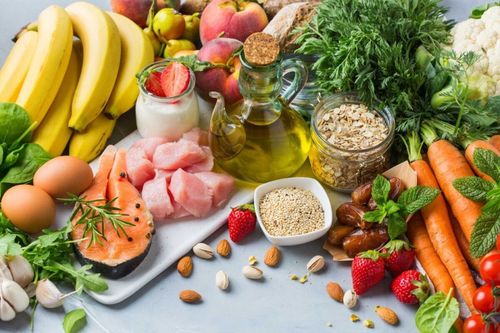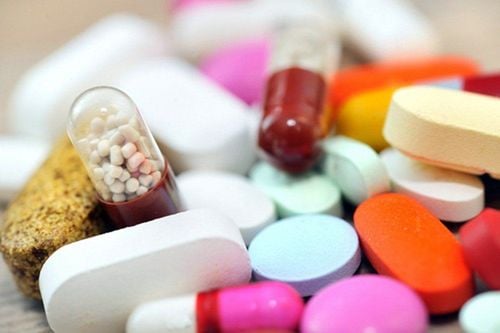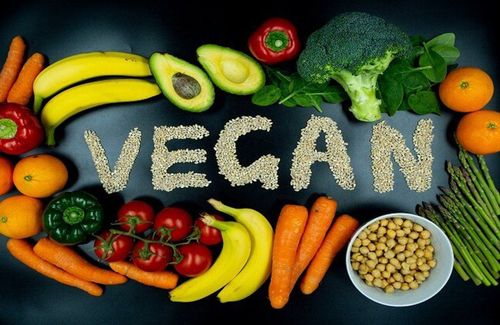This is an automatically translated article.
A healthy diet plays an important role in diabetes control. Can a vegetarian diet help control blood sugar? The article will share information about a vegan diet for people with diabetes, its benefits and disadvantages.
1. What is a Vegan Diet for Diabetics?
A vegan diet means that there is absolutely no meat, dairy or animal products in the meal. You need to plan carefully if you decide to go vegetarian when you have diabetes to ensure that you fully meet your body's nutritional needs.
For people with diabetes, following a vegan diet will require planning in advance. Vegetarians with diabetes need to maintain their carbs throughout the day (because carbs affect blood sugar more than fat and protein). Patient meals and snacks should have a balanced composition of carbs, protein, and healthy fats.
All of the above can be done using plant-based foods. This can be a bit difficult for those who are new to the vegan diet. Here are some examples of carbs, proteins, and fats that you can use to build meals and snacks if you follow a vegan diabetes diet:
Carbs: Whole grains whole grains (pasta, bread), rice, oats, potatoes, fruit (fresh, frozen, canned without sugar), corn; Protein: Soybeans and soy products (tofu), lentils, peas, peanuts, nut butters, nuts; Fats: Olive oil, avocado oil, avocado, coconut, nuts. Many plant-based foods like beans and whole grains contain a mixture of carbs, protein, and fat, which adds a nutritional boost to your diet. In addition, fiber (a type of hard-to-digest carbs) is found in most plant foods. Fiber helps users stay fuller for longer and reduces the impact on blood sugar levels.
Based on the type of diabetes you have (type 1 or type 2), your physical activity level, age, gender, other factors,... your doctor will help you determine your optimal carb intake. The benefits you need in every meal.
2. Benefits of a vegan diet for people with diabetes
Some of the potential benefits of going vegan for people with diabetes include: Improved blood sugar control, insulin sensitivity, and weight control.
2.1 Control blood sugar A 12-week study of 93 Koreans with diabetes compared the effects of a low glycemic index vegan diet with that of a regular diet. Researchers have found that following a vegan diet helps control blood sugar better than a conventional diet.
Another review concluded: A plant-based diet consisting of a vegetarian diet, the Mediterranean diet, and the High Blood Pressure Diet (DASH) reduced HbA1c levels to zero. ,8%. HbA1c level is a measure of blood sugar management over the previous 3 months. This is a good indicator of long-term blood sugar control.
However, some other dietary patterns also help improve blood sugar control. Some diets (including the low-carb diet and the Mediterranean diet) have more convincing evidence for managing diabetes.
2.2 Increased sensitivity to insulin Insulin is an important hormone that helps the body maintain normal blood sugar levels. Because people with type 2 diabetes are characterized by insulin resistance (cells stop responding to the hormone insulin), increasing insulin sensitivity can lower blood sugar and insulin levels, reducing the need for insulin injections in some people. glycorrhea patient.
Researchers measure insulin resistance through homeostasis model assessment for insulin resistance (HOMA-IR). In a 16-week study in 244 overweight adults, researchers found that those who switched to a low-fat vegan diet experienced greater reductions in HOMA-IR levels than those who followed a low-fat vegan diet. normal, i.e. they become more sensitive to insulin.
A similar study in 75 overweight adults also found that: A vegan diet significantly reduced HOMA-IR, body weight, and fat mass.
2.3 Better weight control Diabetics also have the benefit of better weight control. Losing weight helps people with type 2 diabetes improve insulin sensitivity. Since vegan diets tend to contain less fat and calories than regular diets, they can make weight loss easier.
In a 6-month study in 63 overweight adults, scientists concluded: Those following a vegan diet lost twice as much weight as those following a less rigorous diet. such as: Ethical vegetarian diet (eating vegetables and seafood, no meat) and partial vegetarian diet (eating lots of vegetables, limiting meat consumption).
3. Some Potential Downsides of a Vegan Diet
There are some potential downsides to a vegan diet in general, especially for people with diabetes. Fortunately, these downsides are completely avoidable if you plan your meals carefully.
3.1 Nutrient deficiencies Vegetarians with diabetes may be at risk for certain nutrient deficiencies, especially vitamins B6, B12, niacin, iron, iodine, zinc, calcium, Omega-3 fats However, you can supplement these nutrients by increasing your consumption of these nutrient-rich plant foods:
Vitamin B6: Found in potatoes, chickpeas, bananas, cereals the cup; Vitamin B12 : Found in nutritional yeast, cereals; Iron: Found in white beans, lentils, dark chocolate, tofu, spinach, cereals; Calcium: Found in orange juice, tofu, cereals, kale, broccoli; Omega-3 fats: Found in flaxseeds, chia seeds, soybean oil, canola oil; Iodine: Found in seaweed, id salt, almond milk, soy milk; Zinc: Found in pumpkin seeds, cereals, cashews, almonds, chickpeas, and kidney beans. 3.2 Protein deficiency Vegetarians, especially diabetics, may not get enough protein and amino acids (the building blocks of protein) to maintain health. Protein is essential for building new body tissues, and amino acids also play a variety of roles in health.
However, the above disadvantages can be completely solved by adding more protein-rich foods from plants such as:
Soybeans: Tofu, black soybeans, soy milk; Legumes: Black beans, chickpeas, peanuts, peanut butter, lentils, kidney beans, peas; Nuts: Almonds, macadamia nuts, hazelnuts, nut butters, nut milk, flaxseeds, chia seeds, sunflower seeds, pumpkin seeds; Grains: Quinoa, oats; Protein powder: Pea protein, soy protein. In addition, most vegan protein sources do not contain all the essential amino acids in the right amounts. To ensure that you get all the amino acids you need, vegans should incorporate different plant-based protein sources in their daily meals.
3.3 Consuming Too Many Carbs Another downside that vegetarians with diabetes may face is the overuse of carbs, which can affect blood sugar levels. In fact, plant-based foods tend to contain more carbs than animal-based foods. So a vegan diet will provide a higher amount of carbs than a regular diet. If you eat a lot of processed vegan foods, you may be eating more than the recommended amount of carbs.
While carbs are part of a healthy diabetes diet, it's important to moderate your carbs to maintain healthy, steady blood sugar levels. Therefore, you should talk to your doctor about the optimal amount of carbs to include in your diet.
4. Useful tips for vegetarians with diabetes
To the question of whether diabetics should be vegetarian, the answer is yes, if you have a scientific diet. To get off to a good start and stay on track when following a vegan diet, you should:
Plan ahead: You need to plan your meals, prepare some healthy snacks. Also, it's a good idea to preview the menu when you plan to dine; Eat more non-starchy vegetables: Non-starchy vegetables have very few carbs but are full of fiber and nutrients. They help you feel full and delicious without much impact on blood sugar; Balance Meals and Snacks: You should ensure that each meal and snack has a healthy balance of carbs, protein, and fat along with some non-starchy vegetables; Get the right nutrients: A vegan diet may be lacking in certain nutrients. Therefore, nutritional supplementation is necessary. Your doctor may order a blood test to assess if you have iron, vitamin B12, and vitamin D deficiency. If so, your doctor will recommend appropriate nutritional supplements; Eat plenty of plant-based protein sources: This ensures you're getting the essential amino acids in the amounts needed for good health; Regularly monitor blood sugar: If you have diabetes, even if you are not a vegetarian, you should check your blood sugar regularly to know your health status and notify your doctor if notice any changes.
5. What mistakes should vegetarian diabetics avoid?
When following a vegan diet for people with diabetes, you need to be careful:
Avoid eating too many processed foods : Processed foods, including vegan foods, are often High in sugar and additives, low in fiber and protein. The same goes for fruit juices and carbonated soft drinks. So while it's not necessary to completely avoid these foods, you should limit them, especially if you have trouble controlling your blood sugar. Eating too many processed foods causes weight gain, increases the risk of developing diabetes, high blood pressure and some types of cancer; Avoid low-fat and low-protein meals: You should also avoid carbs-only meals or snacks that are low in fat or protein. Protein can reduce the effect of carbs on blood sugar and increase feelings of fullness. In addition, fat sources such as olive oil may provide benefits for heart health and enhance absorption of certain nutrients. Vegetarian diabetics can successfully control their diabetes (thanks to its ability to improve blood sugar levels, increase insulin sensitivity, and reduce body weight in overweight people). However, people with diabetes need to ensure that they provide enough protein and necessary nutrients, avoid too many carbs, processed foods,...
Vinmec International General Hospital is one of the diseases The hospital not only ensures professional quality with a team of leading medical professionals, a system of modern equipment and technology, but also stands out with comprehensive and professional medical examination, consultation and treatment services; civilized, polite, safe and sterile medical examination and treatment space.
Please dial HOTLINE for more information or register for an appointment HERE. Download MyVinmec app to make appointments faster and to manage your bookings easily.













